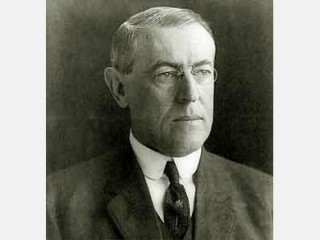
Thomas Woodrow biography
Date of birth : 1856-12-28
Date of death : 1924-02-03
Birthplace : Staunton, Virginia, United States
Nationality : American
Category : Politics
Last modified : 2010-09-21
Credited as : Politician, former U.S. President,
2 votes so far
Thomas Woodrow Wilson was born in Staunton, Virginia, in 1856, into the family of a Presbyterian minister. Wilson dropped the use of his first name after he graduated from college, and was known thereafter as Woodrow Wilson. Wilson grew up in an atmosphere of religious piety and scholarly interests. By the time he was two years old, the family had moved to Augusta, Georgia, where Wilson grew into young manhood. While he was growing up, his father took the young Wilson to many industrial and agricultural sites, where he learned directly about the conditions of ordinary working people.
Wilson began his professional life in a law office in Atlanta, Georgia, but by 1883, at age 27, he decided he wanted to be a college teacher instead of an attorney. He subsequently began to study history and politics at Johns Hopkins University in Baltimore, Maryland, where he obtained a Ph.D. in political science. Wilson thrived as a teacher and later as a professor and scholar. In 1902, at age 42, he was elected president of Princeton University.
His efforts and successes at Princeton University attracted wide public notice. Leaders in the Democratic Party of New Jersey sought him out as a candidate for governor. He was indeed elected governor of New Jersey in 1910. In that office, he enacted a primary election law, a corrupt-practices act, a public utilities act, employee liability law, and various school-reform laws. His work in New Jersey eased many of the burdens of the average working person and also began to reduce corrupt business operations.
Those who worked in national politics did not overlook Wilson's progressive work in New Jersey. He was encouraged to run for federal office, and in 1912, in a race against Republican William Howard Taft (1857-1930), and Progressive Theodore Roosevelt (1858-1919), Woodrow Wilson, a Democratic candidate, was elected to the presidency in a political landslide.
Beginning his presidency in 1913, Wilson quickly began to pursue his domestic political agenda. In October of his first year in office, Wilson's Congress passed the Underwood Tariff Act which lowered the unfair tax rates of imported items like wool, sugar, iron ore, steel rails, and many other important items.
Next he began his most crucial domestic reforms, including the creation of a Federal Reserve Board, later called the Federal Reserve System, to help control money policies in the United States and to insure fairness in all transactions. The creation of the Board is generally regarded as the most far-reaching piece of legislation covering banking and currency in the nation's history.
In 1914 Wilson had established the Federal Trade Commission (FTC) to halt unfair business trade practices. The Clayton Anti-Trust Act was also passed to police unfair practices in business. Wilson's Adamson Act established an eight-hour work day for railroad employees, while his Child Labor Act limited the work hours of children and began a new program of federal regulation in industry.
After two years of successful domestic legislation, Wilson ran into global problems with the start of World War I (1914-1918). Under his leadership, the United States declared war against Germany in 1917 in what he called an effort to keep "the world . . . safe for democracy." For the duration of his presidency Wilson worked on efforts dealing with international issues. Much of his important domestic legislation, which focused on controlling big business and easing the burdens of working people in America, was obscured by his interventions during World War I and his pioneering efforts in the creation of the League of Nations in the post-war era.
Though Wilson is largely regarded as the great war-president who led the United States in World War I (1914-1918) and whose efforts to create the international peace organization the League of Nations led later to its more-stable successor, the United Nations, it is arguable that Wilson's greatest achievements were made by his domestic policies. Such policies and programs began to effectively control the lopsided concentration of power in American business. Woodrow Wilson's first administration successfully enacted many of the progressive federal laws that controlled outrageously high tariffs, monopolistic and illegal industrial practices, and the federal control of the banking system. At the early stages of his presidency, Wilson was also successful in achieving progressive legislation to stabilize the balance between business interests and the interests of American workers, both industrial and agricultural.
Wilson, "tired of swimming upstream," as he put it, died in his sleep in 1924. He suffered a series of strokes for many years before his death.
















